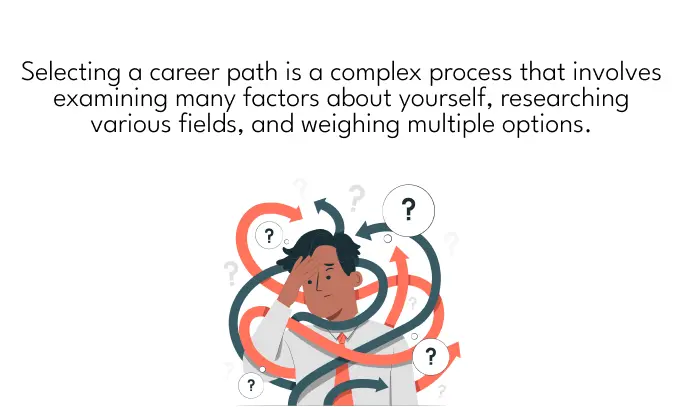Choosing a fulfilling career is one of the most important decisions you will make in your life. Your career has a major impact on your happiness, lifestyle, income, identity, and more. With so many options to consider, making this big choice can feel overwhelming for many people.
This Detailed guide provides crucial advice, key considerations, and practical steps to help you choose the ideal career path.
Choosing a career is Hard But breaking it down step-by-step makes the process manageable !
Table of Contents
Why Choosing a Career Feels Overwhelming
Selecting a career path is a complex process that involves examining many factors about yourself, researching various fields, and weighing multiple options. Here are some of the top reasons this major life decision can feel so daunting:
- So many possibilities – There are countless job titles and career paths to consider. Narrowing down all the choices is challenging.
- Unknowns about yourself – You may feel unsure about your interests, personality, goals, and ideal work environment. These unknowns make it hard to find focus.
- Lack of experience – Without hands-on exposure to different jobs, you may struggle to decide what you want.
- Pressure – The high stakes of making the “right” choice can create stress.
- No perfect choice – There is no one “dream job” that checks every box. Trade-offs are required.
- Changing interests – Your passions and plans will likely evolve over time. It’s hard to commit when you may change your mind.
While the task of choosing a career is complex, it is manageable if you break it down into clear steps. Follow the structured journey below to make an informed, confident decision.
6 Steps to Choose Your Ideal Career
Follow this six-step process to reflect on yourself, explore options, and determine the best career path for you right now:
Step 1: Reflect on Yourself
Your career choice should align with who you are. Dedicate time for self-reflection in these key areas:
- Interests: What topics, industries, and activities do you find intriguing or enjoyable? Make a list of anything that captures your curiosity.
- Values: What moral principles or beliefs are fundamentally important to you? Examples may include helping others, creativity, adventure, work-life balance, etc.
- Skills: What abilities and strengths come naturally to you? These may be things like communication, analysis, persuasion, creativity, etc.
- Personality: What traits define you? Are you outgoing, analytical, empathetic, organized, etc?
- Goals: What are your ambitions for your career and life? Financial stability? Leadership role? Work flexibility? Identify short and long-term goals.
- Ideal Work Environment: Do you want to work alone or on a team? Desk job or active job? Strict schedule or flexible hours? Identify preferences.
- Take your time thinking through these areas. They form the foundation for choosing a career where you will thrive and find purpose.
Step 2: Research Broad Career Fields
Using what you learned about yourself, now research broad career fields that may be a good fit. For example, if you are analytical and love science, explore healthcare, engineering, or computer science.
Resources to research fields:
- Bureau of Labor Statistics Occupational Outlook Handbook
- Informational interviews with professionals
- Family, friends, and mentors who work in your fields of interest
- Job shadowing or internship opportunities to get hands-on experience
Make a list of 2-3 broad career fields that interest you based on alignment with your values, goals, personality, and skills.
Step 3: Narrow Down Specific Job Titles
Within your fields of interest, identify specific job titles or roles to explore further.
For example, if interested in healthcare, research job titles like doctor, nurse practitioner, physician assistant, physical therapist, etc.
Questions to find the best job titles:
- Does this role fit my interests and personality?
- Does the day-to-day work seem enjoyable?
- Does this career help me reach my goals?
- Does this job offer the salary, growth, and lifestyle I want?
- Is the job outlook positive, with plenty of openings?
- Can I meet the education and training requirements?
Use resources like job boards to research titles that intrigue you. Narrow down to 3-5 specific jobs.
Here are 13 Different Career Fields:
- Administration & Business Management
- Architecture and Engineering
- Culture and Entertainment
- Communication
- Community and Social Service
- Education
- Science and Technology
- Repair & Maintenance
- Farming & Fishing
- Government
- Health and Medicine
- Law and Public Policy
- Sales
Step 4: Shadow Professionals
The best way to understand day-to-day work in a career is to shadow real professionals in that field. Observe their tasks and ask questions. Internships are another great option.
Key insights to gain:
- What does a typical day or week look like?
- What do they like best about the job?
- What are the biggest challenges?
- How does their personality fit this career?
- What is their education and career path?
Even shadowing for just a few hours can help you decide if a career is right or rule it out. The more exposure the better.
Step 5: Evaluate Your Top Choices
With experience shadowing professionals, reflect on your top career choices again.
Make a pros and cons list for each option considering:
| Pros | Cons |
|---|---|
| Fits my strengths and personality | Aspects of the job I may not enjoy |
| Lets me help people or add value | Education time and costs |
| Provides a sense of purpose | Work schedule or environment not ideal |
| Work I find intrinsically rewarding | Stressing parts of my personality |
| Salary and benefits are sufficient | Lower salary than hoped for |
| Promising job growth and stability | Job instability or lack of openings |
| Realistic education/training requirements | Required skills I need to develop |
| Aligns with my lifestyle goals |
Weigh the pros and cons thoughtfully. Determine which careers have the highest ratio of pros to cons for you right now.
Step 6: Make Your Choice & Get Experience
Using your evaluations, choose the 1-2 career paths that you are most excited to pursue at this stage in your journey.
To gain real experience:
- Research education requirements like degree programs
- Apply for internships related to your chosen field
- Ask professionals for informational interviews
- Find entry-level roles or volunteering opportunities
- Consider apprenticeships or job shadowing
As you get hands-on experience, you will confirm whether you enjoy that career path or determine it is not the right fit after all. Either outcome is valuable learning to guide your journey.
Key Factors To Consider When Choosing a Career
To make the best choice, be sure to reflect carefully on these key factors:
-
Interests
Selecting a career path aligned with your interests will make your work intrinsically motivating and fulfilling. Make a list of your passions, hobbies, favorite subjects, and anything that excites your curiosity. Identify overlapping themes to reveal careers you will inherently enjoy.
-
Personality and Values
Your personality traits and core values should guide your career search. Reflect on what matters to you and what environments allow you to thrive. If you value creativity, pursue artistic fields. If you love helping people, consider healthcare or education. Find work that is meaningful to who you are.
-
Skills and Abilities
Consider your natural talents, skills, and strengths. Look for careers that utilize your capabilities, whether that is physical abilities, interpersonal skills, analytical thinking, creativity or anything else. This creates a rewarding match between your aptitudes and day-to-day work.
-
Work Environment
What work environment fits your personality and priorities best? Important factors are schedule flexibility, remote work options, team-based collaboration, a fast-paced setting, an office or active job site, etc. Look for careers that offer the work culture and lifestyle you want.
-
Job Outlook and Growth
Research job growth projections to ensure there will be sufficient openings in your chosen field. Look for careers like healthcare and technology that are evolving to offer stability. While following your passion, be pragmatic in your choices.
-
Salary Potential
While money should not be the sole driver, salary is an important consideration, especially in terms of meeting your lifestyle goals and financial obligations. Review salary data to find careers that pay reasonably well for your education investment and offer the potential to reach your income goals.
-
Education Requirements
Evaluate if the time, costs, and effort to get your required degree or training are feasible for you. Make sure you can meet the education expectations in areas that interest you. Consider starting with certificate programs or associate degrees that take less time to complete. You can always expand your education later.
Final Tips for Choosing Your Career
- Take career assessments to uncover your interests and personality type. Understanding your attributes can reveal well-suited careers.
- Talk to family, friends, mentors, professors, and professionals to get insights. Networking will give you guidance.
- Remain open-minded. Your interests, goals, and plans will evolve. What you love today may be different 5-10 years from now.
- Make choices based on who you are today, but know you can pivot in the future as you grow. There are many paths to a fulfilling career.
- Gain real-world experience in fields of interest through internships, volunteering, job shadowing, and entry-level jobs.
- If you are undecided or indecisive, start pursuing foundational education like a business, technology, or general education degree to keep your options open.
- Your first job after secondary school does not have to be your forever career. Use early roles to learn what you enjoy.
Choosing a career is a complex decision, but breaking it down step-by-step makes the process manageable. Be true to who you are, follow your interests and values, research options thoroughly, get real-world experience, evaluate choices wisely, and remain flexible. You’ve got this!

